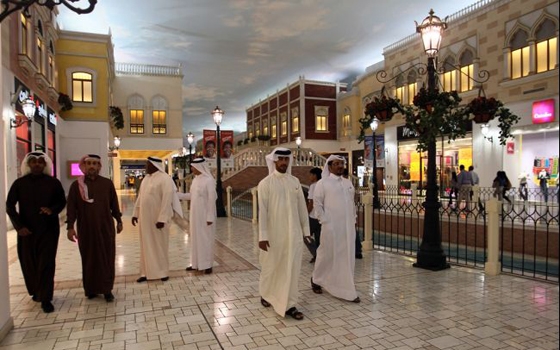Higher income levels, together with greater choice for consumers and changes in shopping patterns, are set to drive growth in Qatar’s retail sector, despite mall operators finding themselves in an increasingly competitive marketplace.
Qatar is set to lead when it comes to retail sales growth in the near term, according to a report released at the end of January by Alpen Capital. Qatar’s fast-growing population and large infrastructure projects have been supporting double-digit growth since 2011. According to the investment bank, the size of retail trade, restaurants and hotel sector in Qatar showed a 15.8% year-on-year (y-o-y) growth to $12.5bn in 2013. However, this is still dwarfed by sales growth in the UAE – with Dubai home to 30% of total Middle East luxury sales – estimated at 7.6% y-o-y to $52.1bn in 2013.
Nonetheless, retail sales in Qatar are expected to rise by a compound annual growth rate (CAGR) of 9.8% through to 2018, the bank concluded, compared with a rate of 6-7% across other countries in the GCC. According to the report, “while retail sales growth across all the GCC countries is expected to remain positive between 2013 and 2018, the outlook for Qatar is most optimistic.”
Food for thought
Growth looks set to be particularly strong in the supermarket and hypermarket segment, with food products expected to be a key driver of sales. This is linked to a rising interest in healthier lifestyles and a shift in shopping practices, according to analysts.
New growth will go hand-in-hand with a sharp increase in retail space. Qatar’s leasable mall retail space is expected to reach about 954,000 square meters (sq m) by the end of 2015, rising to at least 1.8m sq m when more than a dozen operational malls in the pipeline are completed, according to forecasts.
The emergence of new, larger-scale developments in the market will put added pressure on both smaller shopping centers and stand alone outlets, which could struggle to compete with the appeal of larger outfits.
The Managing Director of the Mall of Qatar, Shem Krey, told OBG that competition amongst retailers was becoming increasingly tough. The mall, which is scheduled to open in early 2016, contains 256,000 sq m of gross leasable area (GLA). With 70% of the space already being snapped up, Krey acknowledged that Mall of Qatar is looking to provide a range of services to attract and retain high-end and popular retailers. “The amount of competition locally from other mega malls has changed the strategy of how we are developing the Mall of Qatar … retailers now have numerous options of where to open,” he said.
Additional offerings
New openings of large-scale centers, such as Doha Festival City and Place Vendôme, which are scheduled to begin operating in the third quarter of 2016 and 2017 respectively, will further increase available GLA. However, retailers may have to find more innovative ways of attracting shoppers in a more crowded marketplace where consumer choice is already plentiful.
“Overall, the Qatari market can still sustain more retail space but the influx of new malls means that operators need to find a way to differentiate themselves from the others … as the markets become saturated, the malls will fail unless they have one or more unique selling point,” Doha Festival City CEO Kareem Shamma told OBG. “Competition will force retailers to drive up the quality and range of their product offerings”.
Krey noted that the fundamentals of the market and potential for further growth in the sector remain strong. “Given the rapid increases in population growth and subsequent increased sales, we can rest assured there is a consistent high demand from consumers for malls of this size, quality and unique offering to be successful,” he said.
MasterCard’s latest consumer confidence index, released in mid-November, confirmed an optimistic sentiment amongst Qatar’s shoppers. The state came top amongst the Middle East countries for consumer sentiment, with its overall score of 97.2 one of the highest globally. The report found Qatari consumers to be “extremely optimistic” across all five indicators on the index. Sentiment in the key 18 to 30 age demographic was particularly noteworthy, with Qatar scoring 98.2 points in this field.
Oxford Business Group
20 February























































